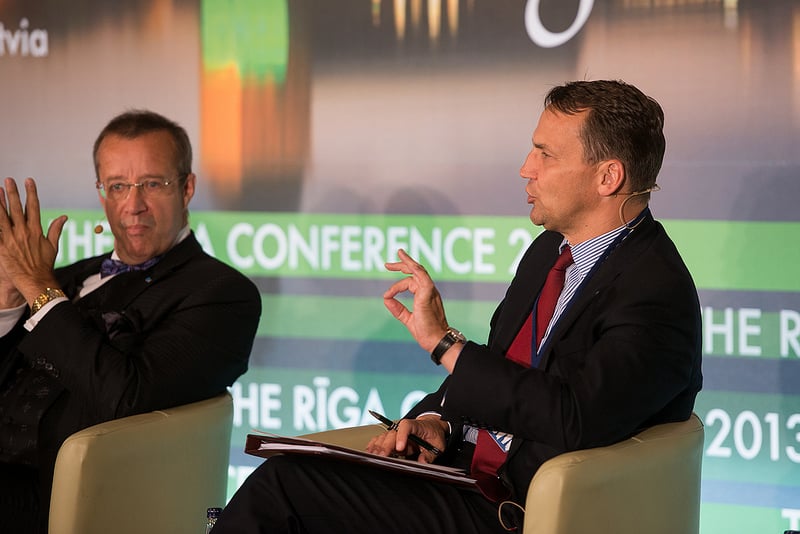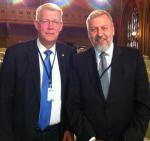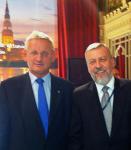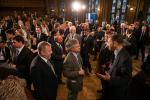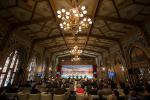Andrei Sannikov: Events in Belarus and Syria are same type occurrences
40- 9.09.2013, 7:34
- 66,673
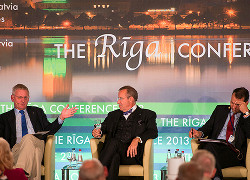
Dictatorships are annihilating peoples and the world stands idle.
It was the message from the European Belarus civic campaign leader Andrei Sannikov’s speech at a conference in Riga.
The International Conference in Riga took place from 6 to 8 September in Latvia’s capital. At the conference, attended by presidents, Prime Ministers and Ministers of Foreign Affairs of the European Union countries, the EU’s position as an international player, NATO’s role, the conflict over Syria, the situation in the post-Soviet space, the European Union’s strategic plans and the Eastern Partnership initiative were discussed.
Most attention was paid to Belarus during the panel discussion on the Eastern Partnership. At the conference our country was represented by the leader of the European Belarus civic campaign, presidential candidate 2010 and former political prisoner Andrei Sannikov. For the first time an official representative from Minsk – deputy Minister of Foreign Affairs Alena Kupchyna - was invited to participate in the discussion. This only proved Latvia’s special attitude to a dictatorship at its borders. It is known that Latvian business is actively lobbying for the interests of the dictatorial regime in Europe, and the current government and politicians are susceptible to this lobbying.
A former Prime-Minister of Lithuania Andrius Kubilius, Minister of Foreign Affairs of Georgia Maya Pandzhikidze, deputy Minister of Foreign Affairs of Ukraine Andrej Olefirov and deputy Minister of Foreign Affairs and European Integration of Moldova Julian Groza also participated in the panel discussion on the Eastern Partnership.
Lukashenka’s regime looked like a black sheep, since Ukraine, Moldova and Georgia have significantly moved forward in their relations with the European Union in the Eastern Partnership framework. At the upcoming summit in Vilnius they are going to sign or initial documents on the development of these relations.
Andrei Sannikov rigidly reacted to this situation in his speech:
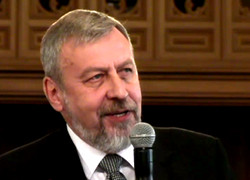
“I was a deputy Minister of Foreign Affairs of Belarus and I quit protesting against the referendum of 1996, because there was a threat of Lukashenka’s usurpation of power and Belarus’ refusal from the way it seemed to had taken in the beginning of the 90-ies. Unfortunately, this way it happened. After that I have become an opposition activist with all the consequences: threats, intimidations, detentions, arrests, prison and attacks.
Together with like-minded people we founded a civic campaign European Belarus in 2008 and it was exactly the platform for my participation in 2010 presidential elections. The platform was supported by a large number of Belarusians. Apart from that, these were not only my views and my political strategy – they were shared by many democratic leaders, including some presidential candidates. That is why I was beaten, arrested and thrown to prison in 2010 on the day of elections. The reason was the support of this way of development, shown by a large number of people.
People in Belarus closely follow what happens in the European Union, how the Eastern Partnership develops. The conference in Riga was a place where we used to discuss values, but today a representative of a criminal regime is taking part in the discussion.
Believe me, an open discussion of a system of values with democratic representatives, the support of these values, however symbolic, used to help democratic movement in Belarus. The signals that the current Riga Conference is sending will be perceived differently in Belarus.
Despite all the dramatic differences in the situations in Syria and Belarus, what is taking place in our countries are the same type occurrences, the events of the same nature. A dictatorship is annihilating the people of the country. We will not achieve anything without a decisive support to values, without decisive actions in support of values.
The role of the deputy Foreign Minister, present here, is unenviable. She was appointed another “liberal”, who is supposed to be selling the dictatorship to Europe. Not for changes to happen in Belarus, but to get money from Europe for supporting the dictatorship.
Latvia is known for its soft position towards the dictatorship in Belarus. This can be explained by the fact that it cannot but listen to its business lobby. I have bad news for Latvia’s government. In prisons and colonies I met businessmen from Russia, Ukraine, Poland, Lithuania and Latvia. They tried to have business in Belarus. The regime guaranteed special preferential conditions to some. They were deprived of the businesses, put in jail and keep blackmailing them even in jail.
If Latvia’s government and the governments of other neighboring European countries really care about their businessmen, they should think broader, they should think of creating a favorable environment in the neighborhood, without a dictatorship.
The European Union has leverage for that. I have good news too: the sanctions do work. Me and my friend were released, because the EU took a decisive step in March 2012 and introduced sanctions against business. Unfortunately, the regime only understands this kind of talk.
It is said in the Prague declaration (the declaration on the launch of the Eastern Partnership program - charter97.org) that the partners will be subjected to the norms of international law, including the rule of law, democracy and the respect for human rights and basic freedoms. Nothing is said of the dictator’s equal rights there. It says about the adherence to principles. From today’s speeches by the representatives of Georgia, Ukraine, Moldova we heard that their countries are moving in that direction, and this gives hope.
The some in Vilnius is indeed important. It is very important for Belarus, but for Europe to, as well as for the European Partnership for the summit in Vilnius to show the adherence to these principles, not to the policy of pacifying the dictator”, - Andrei Sannikov stated.
In the framework of the Riga Conference the leader of the European Belarus discussed the situation in our country with Sweden’s Minister of Foreign Affairs Carl Bildt, Poland’s Minister of Foreign Affairs Radoslaw Sikorski, parliament members, representatives of European MFAs, gave several interviews. The situation over political prisoners in Belarus was in the center of attention, because their number was growing, and the recent releases of the prisoners of conscience took place only because their imprisonment terms expired.
Andrei Sannikov thanked Latvia’s former president Valdis Zatleris, who was also present at the conference, for his principled position on the dictatorship in Belarus. When Zatleris was Latvia’s leader, he stuck to this position despite the pressure from business circles.
